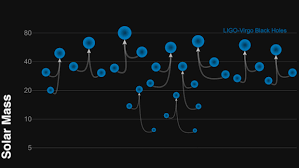
Japanese scientists utilized a mix of ground and space based telescopes and revealed over 100 new extrasolar planets.

The LIGO and Virgo collaborations have now confidently detected gravitational waves from a total of 10 stellar-mass binary black hole mergers and one merger of neutron stars.
It will map and study the tiny world in great detail, eventually returning a piece of Bennu to Earth in 2023. The discoveries of OSIRIS-REx will shed light on our solar system's ancient history.

An international team of scientists have detected gravitational waves from the biggest known black-hole collision that formed a new black hole about 80 times larger than the Sun.

Many supernovae show a gradual increase in the light they put out. But for ASASSN-18bt, you could clearly see there's something unusual and exciting happening in the early times - an unexpected additional emission.

An important discrepancy in measurements of the universe’s acceleration has theorists wondering whether we’ve gotten something fundamentally wrong in our understanding of the history of the universe.

The Hubble Space Telescope is a hero in the astronomy world - serving 25 years in space. And when it suffered a malfunctioning on October 5th, it took a heroic effort on the part of the Hubble team to get it working again.

InSight spacecraft plunged into the rarefied atmosphere of Mars at a speed of more than 12,000 mph Monday and braked to a gentle touchdown, setting the stage for a two-year surface mission to probe the planet’s deep interior.

This object, a star, could have some sort of orbiting debris that periodically blocks the starlight, but researchers say they need more observations to figure out if that’s possible or if the flicker is caused by something else.

Recent research suggests that most, if not all, stars are born with a binary twin. Our Sun is a solitary star, but there's evidence to suggest that it did have a binary twin, once upon a time and it might have just been found.

Mars 2020 is set to visit the Red Planet to take scientific data and hunt for past signs of life, and to better understand the planet for a future human visit.

Virgin Orbit performed the first captive carry flight of its LauncherOne system Nov. 18. Richard Branson, founder of the Virgin Group, said he expected the first orbital launch to take place in December or January.

ALMA data show the most luminous galaxy in the universe has been caught in the act of stripping away nearly half the mass from at least three of its smaller neighbors.